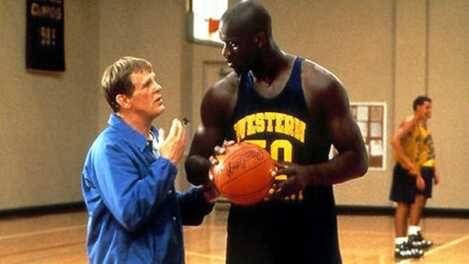C+ | A college basketball coach compromises his morality to get the top recruits. Directed by William Friedkin Starring Nick Nolte, Mary McDonnell, and Shaquille O'Neal Review by Jon Kissel |

The aforementioned recruits, played by Penny Hardaway, Shaquille O’Neal, and Matt Nover, all handle themselves pretty well. O’Neal is the most surprising, as he communicates a natural intelligence underneath his hulking frame and monotone voice. As was true on the court, Penny is stuck in Shaq’s shadow on set. They’re joined by Celtic greats Bob Cousy and Larry Bird, the former of which still can’t miss his free throws and the latter has no qualms about appearing on camera in the midst of a bad sunburn. Half a dozen college coaches are included to provide reaction shots when Bell beats them to the recruits, with Rick Pitino standing out amongst them as a memorably smug presence. Half a dozen more commentators provide color and exposition.
Blue Chips’ sense of verisimilitude doesn’t only come from its stunt casting. The basketball action isn’t perfect; the synching of the game and the scoreboard is out of whack and Friedkin relies too heavily on fast breaks. These are small complaints against wider appreciation. The action is largely understandable, and the film cares enough about tactics to show a thin connection between play creation in the huddle and execution on the floor. Nolte is a credible kind of coach, particularly in the way he throws his body into practice and emphasizes footwork and leverage. That emphasis implies an amount of homework done on the part of frequent sports movie scribe Ron Shelton. I doubt the layman imagines that kind of technical training when writing what an actual basketball practice would look like. See the Ben Affleck Ghost Coach rip-off for an example of unimaginative practices (he just makes them run a lot). For the time period of its release, I also buy Bell’s locker room tantrums, even as they just look childish, counter-productive, and absurd from a modern lens.
However, this isn’t a film about getting the coaching of a basketball team exactly right. This is a film about an established system and the perils of operating within that system when everyone else is finding ways to subvert it. Blue Chips does a fair amount of telling instead of showing i.e. people keep telling Coach Bell that his team at the start of the film is punching above their weight through sheer effort and we don’t really see that. Where it shows is in how the team cannot make the leap if they don’t get the best recruits, and those recruits understand that, to quote Rod Blagojevich, they have a valuable fucking thing. The amenities and the women at all these major colleges are more or less the same. What the coaches can offer them and their families is what’s going to make the difference, and if a coach isn’t willing to ante up, they can look forward to more losing seasons.
Where Blue Chips falls down is in not fleshing out the moral quandary that Coach Bell puts himself in. Set aside the impossibility of operating a team where the freshmen have been loaded up with a steady stream of gifts and the upperclassmen received none of these perks, an outcome the film doesn’t even consider. Blue Chips puts the argument against the NCAA in the mouth of Happy, such that the school is making millions and the coach is likely the highest paid public employee in the state, but the athletes cannot make a dime off their talents despite often coming from environments where time off from income generation is a luxury they can’t afford. By sticking to the rules, Coach Bell briefly becomes a lawful evil type, abiding blindly by unjust rules. The film never makes the case that those rules are worth following, ultimately allowing Bell to walk away and return to a purer form of basketball at the high school level. Perhaps the film is taking a stand by having its hero refuse to engage any further, but that doesn’t mean it isn’t difficult to see what exactly the problem is in providing for the players. Bell is making an argument from principal, while imperfect messenger Happy is arguing from a place of tangible need. The better ending might be Coach Bell embracing the cheating lifestyle and feeling good about it.
So much has happened in the decades after Blue Chips that this is the kind of film that demands a remake or a sequel. Spike Lee’s He Got Game is something of a follow-up, if Penny’s character was the lead, while High Flying Bird more recently examined the relationship between pro players and their team owners. Where’s the film about Ed O’Bannon, or the fictionalized student-athlete who is financially struggling but wouldn’t be if he could sell a few autographs? The NCAA and its many member schools have only gotten richer since 1994, so it’s not like this problem’s gone away. Blue Chips is only as indicting as it’s allowed to be, a shame when there’s so much to indict. B-
 RSS Feed
RSS Feed